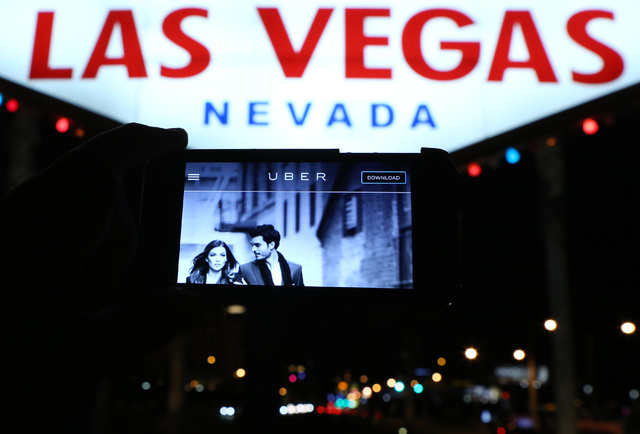Legislature approves bill authorizing Uber, Lyft in Nevada


CARSON CITY -A bill authorizing ride-hailing companies like Uber and Lyft to operate in Nevada won approval early Saturday in the Nevada Legislature, but it didn’t happen without plenty of confusion.
A 3 percent excises tax on fares, including on taxis and limousines, was also approved, which will raise tens of millions in new revenue, including $19 million to fully fund the new medical school at UNLV.
In Assembly and Senate floor sessions that lasted until the early morning hours on Saturday, the Assembly signed off on Assembly Bill 175, sending it to Gov. Brian Sandoval, who is expected to sign the measure.
The bill is effective upon passage and approval but companies must apply to the Nevada Public Utilities Commission before they can begin operating.
Supporters expect that the tax could generate about $70 million over the biennium, a new revenue stream Senate Republicans touted as a way to fund a new medical school at UNLV.
The original Uber legislation, Senate Bill 439, died last month when it failed to get the 14 votes needed for passage in the Senate.
Under the latest proposal, transportation network companies that connect drivers and riders through smartphone apps will be able to operate in Nevada.
In a statement, Uber said: “Nevadans are the winners today. Thanks to the bipartisan leadership of both houses of the Nevada State Legislature, Uber is well on its way to returning to the Silver State, bringing with it thousands of jobs and greater access to safe, reliable and affordable transportation options for all Nevadans.”
The measure will require every driver to continuously provide insurance during any time a driver is providing transportation services of at least $1.5 million for death or bodily injury.
But the vote did not come without significant confusion. The original plan was to approve regulations to let Uber and Lyft operate in one measure, Assembly Bill 176, and authorize the tax levy in AB175. But the Assembly only concurred in AB175 and rejected AB176. The effect of the action was to remove a provision that would have had the companies regulated by the Nevada Transportation Authority instead of the PUC.
When some lawmakers figured out that they may have voted for the wrong bill and approved taxes, there was a brief attempt to reconvene the Assembly. But that attempt failed.
The legislative fight has pitted Uber, a multibillion-dollar technology company based in San Francisco and its contracted drivers against representatives of Nevada’s multimillion-dollar taxi and limousine companies and their employee drivers.
The fight was expected after Uber started operating in October 2014 and a month later stopped service in the state after losing a court case. After bowing out, Uber officials made it clear that they would seek legislation enabling operation.
Uber had contended that it is a technology company, not a transportation provider, and therefore should not be subject to transportation regulations overseen by the Nevada Transportation Authority and the Nevada Taxicab Authority.
Opponents argued that because Uber’s contracted drivers transport passengers in the same way as taxi and limousine companies, they should be subject to the same rules.

RELATED STORIES
Someone will be unhappy if ‘Uber bill’ is enacted in Nevada
Henderson business leaders back Uber’s return
Despite Uber petition, service is still illegal in Nevada
See all of our coverage: 2015 Nevada Legislature.
Related Stories
Someone will be unhappy if ‘Uber bill’ is enacted in Nevada
Uber rallies support to let it operate legally in Nevada
Despite Uber petition, service is still illegal in Nevada
Uber tries to rally public support for its technology
Nevada judge rules against ride-sharing firm Uber
Henderson business leaders back Uber’s return
EDITORIAL: Legislature must let Uber operate in Nevada
Uber faces off with Nevada taxi industry in court
Uber holds first meeting in Las Vegas with prospective drivers












